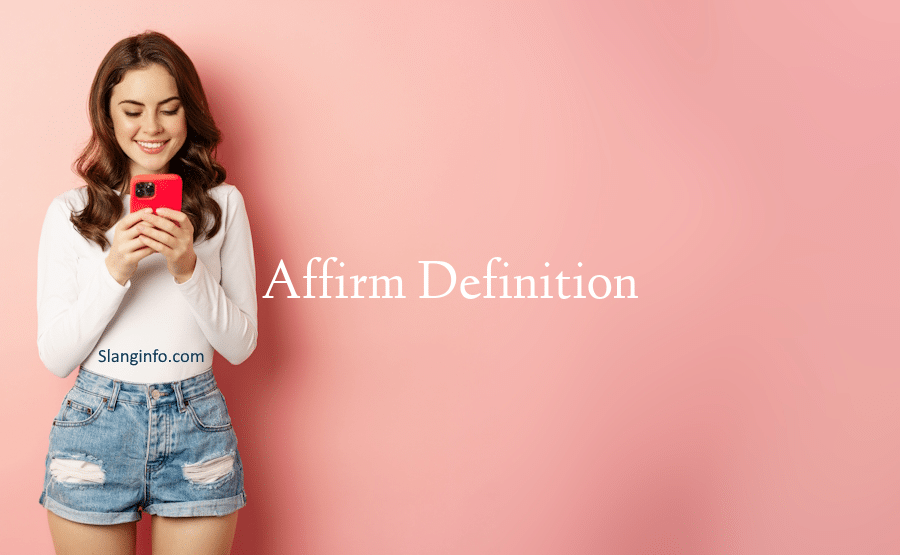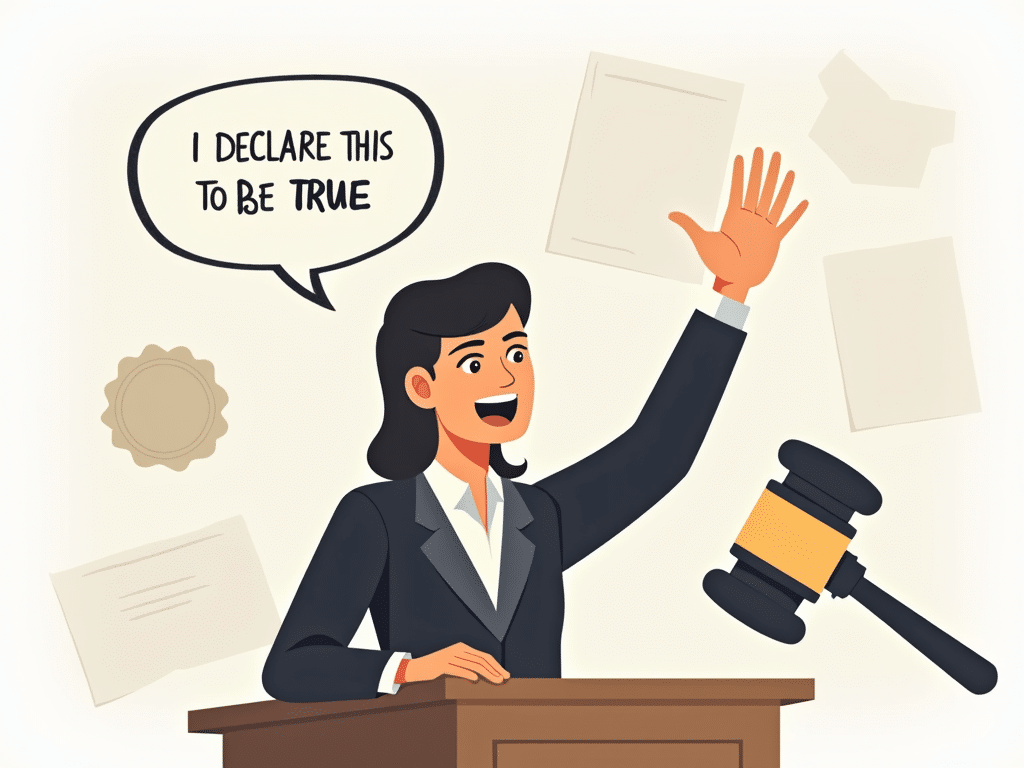Hey there, word nerds and curious cats! Today we’re diving into the world of “affirm.” Now, you might be thinking, “Isn’t that just a fancy way of saying ‘yes’?” Well, buckle up, because affirm is so much more than that! From courtroom drama to self-help mantras, this little word packs a punch. Let’s unpack the affirm definition and see why it’s got everyone from judges to influencers talking.
| Key Takeaways |
|---|
| Affirm means to state something as true or show strong support |
| Used in legal settings as an alternative to swearing an oath |
| Popular in self-help and personal development for positive affirmations |
| Can be used to strengthen relationships and communication |
| Has both formal and informal applications |

Affirm Definition: Breaking Down the Good Vibes
Affirm Meaning: Alright, let’s get down to brass tacks. To affirm means to state something as true or to show strong support for something. It’s like giving a high-five to a fact or an idea. In the formal world, it’s what you do in court when you promise to tell the truth without swearing on a Bible. In the self-help world, it’s all about those positive statements you repeat to yourself in the mirror. “I am awesome,” you say, and boom – you’re affirming!
Affirm Meaning in Text: In texts and social media, affirm often shows up in more casual ways. You might see it like this:
- “Just affirmed my bestie’s new haircut. She’s slaying 💇♀️”
- “Affirming my goals for the day: crush this presentation and get tacos after 🌮”
- “Can you affirm that you’ll be at the party? Need to know for the snack situation 🍕”
It’s like saying “I’m 100% behind this” or “Yes, and I really mean it!”
The Affirm Spectrum: From Courtrooms to Bathroom Mirrors 🏛️🪞

Affirm isn’t just one thing – it’s got range, baby! Let’s break it down:
- Legal Affirm: This is the serious stuff. When you affirm in court, you’re promising to tell the truth without swearing on a religious text. It’s like pinky promising, but with jail time if you lie.
- Personal Affirm: This is where the self-help gurus shine. It’s all about those positive statements you repeat to boost your confidence. “I am a boss,” you say, hoping your brain gets the memo.
- Relationship Affirm: When you affirm your love or support for someone, you’re basically saying, “Hey, I’ve got your back, for real.”
- Professional Affirm: In the business world, affirming might mean agreeing to a contract or supporting a colleague’s idea. It’s like a professional fist bump.
Whether you’re affirming your innocence to a judge or affirming your awesomeness to yourself, it’s all about standing firm in what you believe.
Also read: WILDIN
The Affirm Playbook: How to Use It Like a Pro 🎭
So, how do you flex your affirm muscles in real life? Here are some scenarios:
- In Court: “I affirm that the testimony I’m about to give is the truth, the whole truth, and nothing but the truth.” (Cue dramatic music)
- To Yourself: “I affirm that I am capable of handling whatever challenges come my way today.” (Now go conquer that to-do list!)
- To a Friend: “I affirm that your new song is absolute fire, no cap.” (Watch their face light up)
- At Work: “I affirm my commitment to finishing this project by Friday.” (Your boss will love this one)
Remember, affirming is all about being clear, positive, and genuine. It’s not just empty words – it’s about backing up what you say with real belief and action.
Affirm vs. The World: How It Stacks Up 🌍
Now, you might be wondering how affirm compares to other similar words. Let’s break it down:
| Word | How It’s Different |
|---|---|
| Confirm | More about verifying facts, less about personal belief |
| Swear | Usually involves an oath or religious element |
| Agree | More casual, doesn’t have the same strength as affirm |
| Declare | More formal announcement, less about personal conviction |
Affirm is like the cool cousin who’s welcome at both formal events and chill hangouts. It’s versatile, yo!
Also read: Rekt
The Power of Affirmations: Boosting Your Daily Life 🌟

Alright, let’s dive into the world of affirmations. These are those positive statements you repeat to yourself to boost your confidence and mindset. Think of them as little pep talks that can help you tackle the day like a pro.
Creating Effective Affirmations
Crafting the perfect affirmation is all about focusing on the positive and keeping it simple. Here are some tips:
- Keep It Positive: Focus on what you want, not what you don’t want. Instead of “I won’t fail,” try “I am successful.”
- Be Specific: Tailor your affirmations to fit your goals. “I am confident in my math skills” is better than just “I am confident.”
- Use Present Tense: Speak as if it’s already happening. “I am healthy and strong” rather than “I will be healthy and strong.”
- Make It Personal: Use words that resonate with you personally. This makes the affirmation more meaningful.
Incorporating Affirmations into Your Routine
Affirmations work best when they’re part of your daily routine. Here are some ways to integrate them:
- Morning Routine: Start your day by repeating affirmations while brushing your teeth or getting dressed.
- Journaling: Write down your affirmations in a journal each day.
- Phone Reminders: Set reminders on your phone to repeat your affirmations throughout the day.
- Visualization: Pair affirmations with visualization techniques for an extra boost.
It’s like giving your brain a workout – the more you practice, the stronger it gets!
Also read: MOXIE
Challenges and Criticisms of Affirmations 🧐
While affirmations can be powerful, they’re not a magic fix for everything. Here are some challenges to keep in mind:
- Toxic Positivity: Over-relying on affirmations can sometimes lead to ignoring real problems or feelings.
- Lack of Action: Affirmations need to be paired with action. Saying “I am successful” won’t work unless you’re also putting in the effort.
- Unrealistic Expectations: It’s important to keep affirmations grounded in reality. Aim high, but stay realistic.
Remember, affirmations are just one tool in your self-improvement toolkit. They’re most effective when combined with other healthy habits and actions.
Affirm in Popular Culture: From Self-Help Books to Social Media 📚📱
Affirmations have made their way into all corners of pop culture:
- Self-Help Literature: Books like “The Power of Positive Thinking” emphasize the importance of affirming beliefs.
- Movies and TV Shows: Characters often use affirmations for comedic effect or personal growth arcs.
- Social Media Trends: Hashtags like #DailyAffirmation encourage sharing positive vibes online.
It’s clear that affirming has become a staple in how we approach personal growth and mindset shifts.
The Future of Affirmations: What’s Next? 🔮
As our understanding of psychology and technology evolves, so too does the world of affirmations:
- Apps and Technology: More apps are being developed to help people create and track their affirmations.
- Integration in Education: Schools might incorporate affirmation practices into their curricula to boost student confidence.
- Corporate Use: Companies may adopt affirmation practices as part of team-building exercises or wellness programs.
The future looks bright for affirmations as they continue to be embraced by various sectors for their potential benefits.
Wrapping It Up: Embrace the Power of Affirm 🌈
So there you have it! Whether you’re using affirm to back up a statement in court or boost your mood with daily affirmations, this word packs a punch. It’s all about standing firm in what you believe and using that conviction to make positive changes in your life.
Remember, while words have power, they’re most effective when paired with action and intention. So go ahead, craft those killer affirmations, back them up with real effort, and watch as you transform challenges into opportunities.
Stay positive, stay proactive, and keep those good vibes flowing! You’ve got this! 💪✨







